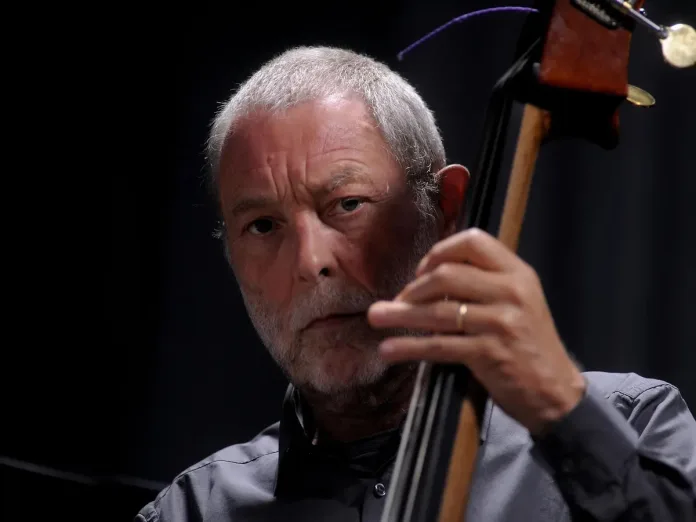HIT CHANNEL EXCLUSIVE INTERVIEW: March 2024. We had the great honour to talk with a legendary bassist, composer, bandleader and educator: Dave Holland. He is best known as a member of Miles Davis’ band during his “Electric Period”, playing on albums such as “In a Silent Way” (1969) and “Bitches Brew” (1970). As a bandleader he has released several albums since 1973 and he has also collaborated with Chick Corea, John McLaughlin, John Abercrombie, Jimi Hendrix, Jack DeJohnette, Sam Rivers and many others. In 2021 he released his latest studio album, “Another Land”. On 25th April the Dave Holland Trio with Jaleel Shaw on alto saxophone and Eric Harland on drums will perform in Athens at the Athens Conservatoire (buy your tickets here) . Read below the very interesting things he told us:
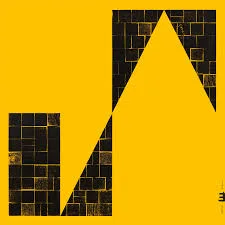 How much different is the dynamics of the trio format on “Another Land” compared with your previous albums such as “Prism” (2013) and “The Art of Conversation” (2014)?
How much different is the dynamics of the trio format on “Another Land” compared with your previous albums such as “Prism” (2013) and “The Art of Conversation” (2014)?
Well, you know, the different configuration always affects the music because the music which is to play is crafted around the personnel and in “Prism” we had a great pianist with us, Craig Taborn, and the music incorporated his way of playing and of course the keyboard opportunities. Kevin (ed: Eubanks -guitar) and I have been playing since 1999 in various situations. We ‘ve done duos, trios, and this trio, we’ve done quite a lot of work together over the years. Now -you may not know this, this is the news for you- Kevin’s mother who is at quite advanced age has some health problems and he called me about two weeks ago to tell me that he is unable to be on this tour with me, so I ‘ve invited Jaleel Shaw, who is a wonderful saxophone player I ‘ve been playing with in this new quartet that I have and Jaleel will be join us for the tour instead of Kevin. He regrets it very much but of course, family matters take precedence over musical. So, I just would like you to know that before we continue.
I love “Passing Time” from “Another Land” album. Please tell us everything we should know about this song.
Most songs that I write are basically written for a particular group of people. Although some things can be translated into other formats and groups. This piece was divided into two sections: One is sort of a section where we have some open jam opportunity and there is another section that has a much more involved chordal section to it. We use these two sections to create contrasting moments in the performance of the piece.
Do you think that the end result of “Another Land” reflects the fact you had toured with Kevin Eubanks (guitar) and Obed Calvaire (drums) before going into the studio for this album?
That piece we had not played before we went in the studio; we had done some of the other pieces, but that was a new piece that was written shortly before the recording session. Normally, I would like to play the music on tour because I like to have the chance to develop it, but of course because this trio we’ve worked together, we already had a musical language we’ve been developing with each other and we quickly discovered some possibilities for this tune and that’s what you hear on the album.
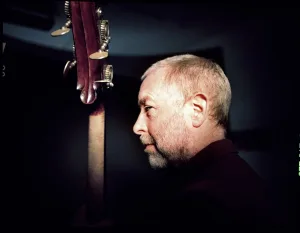 How natural was your decision to play electric bass on some of the songs of “Another Land” album?
How natural was your decision to play electric bass on some of the songs of “Another Land” album?
On some of our live performances, I’ve been using electric bass. As you know it’s part of my history, I started on electric bass when I was 13 and I had various periods in my life where I played the instrument with different situations, on different recordings and so on. I saw this as an opportunity to introduce the electric bass to this trio, there were some songs which I thought would work very well for it. I’ve recently acquired a small scale electric bass which allows me to travel easily with it, along with my acoustic bass, so I can travel with both. It’s a beautiful instrument made by Michael Tobias.
How important factor is it for you to have fun playing music?
It’s one of the biggest factors. The music can express a lot of feelings: It can be joyful, it can be sad, it can represent all the moods of human experience, but at the bottom of the experience, is the collective experience, which for me it’s a very joyful thing; to get together with musicians and be able to share the music and the spontaneous creation of the music together, the dialogue, the conversation. This thing is the most fun for me. I made a record a few years ago called “Prime Directive” (1999) and my prime directive is: “If you are not having fun, there is something wrong”. So, that’s what the prime directive is now.
How much has your perspective on composition changed over the years?
You are developing a language as you write and that language evolves just like your playing language evolves. I try to write, as I said earlier, according to the ensemble that I am writing for and the people I’m playing with and that hasn’t changed. It’s only a different experience depending on who’s playing the music. But conceptionally my playing has changed, I think, it has evolved over the years and along with that there have been some changes in my compositional process and the kind of pieces that I ‘ve been writing. So, I would say it has changed. In the early days I was writing music that was mostly for open form improvisation and as my things changed that I wanted to play, I started changing some of the things I wrote into the compositions.
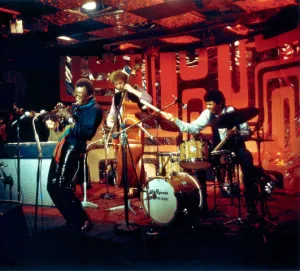 What did Miles Davis try to achieve on “Filles de Kilimanjaro” (1968) by having you on double bass and Ron Carter on electric bass?
What did Miles Davis try to achieve on “Filles de Kilimanjaro” (1968) by having you on double bass and Ron Carter on electric bass?
That record was bridging the transition from Herbie Hancock (piano) and Ron Carter working with Miles to first of all me joining Miles and then to play the bass because, Ron hadn’t been working in the band for a year or more; he did a few gigs, he did a tour in Europe I think but Miles had been using different bass players. Then, Chick (ed: Corea -piano, electric piano) joined the group and part of it was recorded before that happened and part of it was recorded after Chick and I were in the band. So, the reason for the difference of personnel was simply because it bridged the transition between the two personnel changes.
Had you realised when you recorded “Bitches Brew” (Miles Davis -1970) that you created one of the best albums of all time?
Of course, not. No. I mean, I think any time you are in the studio with Miles Davis you expect at least the album will be something incredible because he was an incredible musician and there was a big change going on in the music. How it was gonna be received, was not something that I was concerned with or even was thinking about. I was just trying to realise Miles Davis’ vision for what he wanted to do, as we all were and that was primarily in my mind when we did the recording.
Wayne Shorter (saxophone) missed the plane for Newport Jazz Festival 1969 and you played as a quartet. Did you enjoy that performance which was released a few years ago (“Bitches Brew Live” -2011, tracks 1-3 & “Miles Davis at Newport 1955–1975: The Bootleg Series Vol. 4” -2015, disk 3, tracks 1-3, the same as “Bitches Brew Live”) ?
Very much I enjoyed it. In fact, I insistently since that event every time every time I would see Teo Macero (ed: Miles Davis producer), I would say to him: “What happened to that recording?” and for many years he told me that there was no recording and I said: “Teo, I have a memory that you were there and the engineer and it was being recorded”. Well, finally after Miles died, they went through all the archive at Columbia Records and of course discovered the recording. So, I was very happy, for one thing, because Wayne was not there, Miles played much more than he would normally play and I thought that he played an incredible set that day and I’m so happy that it eventually came out on a recording which everybody can hear.
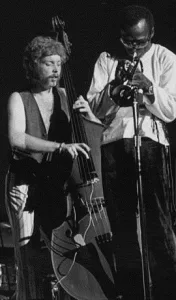 What memories do you have from the Isle of Wight Festival in 1970?
What memories do you have from the Isle of Wight Festival in 1970?
I remember flying in on a helicopter over a sea of orange and blue tents and I remember a huge-huge audience, the biggest audience that I have ever seen before or since. It was the most incredible energy there and we played our set as we normally did, what we were doing at the time. I do remember that the artist that played before us was called Tiny Tim and Tiny Tim was a kind of novelty act where he played ukulele and sang “Tiptoe Through the Tulips”, and I thought how extraordinary that this would go on stage just before we went on stage.
You played live for the first time with Miles Davis, Thelonious Monk and Stan Getz without rehearsing. Was it as terrifying as it seems to the average listener?
No, because that was normal, that was how it was done. Very often you didn’t have rehearsal, you were expected to do your homework and when you turned up you had to be ready. So, this was the way things were done. Luckily, I knew Miles’ recordings, I had a chance to meet with Herbie Hancock for a couple of hours, the day before the gig and Herbie showed me a couple of Wayne Shorter tunes which I didn’t know the exact chord sequences in the songs and he was very gracious and helped me with that. But I didn’t meet the band or know what the set was gonna be until we were on stage and Miles never announced. He just would start something and then you joined in. So, that was the way it was and you had to be ready and I tell that to my young musicians that I meet, I say: “You have to be ready”.
How did you get to jam with Jimi Hendrix at the Record Plant Studio with Larry Young (Tony Williams Lifetime) on Hammond?
It wasn’t Larry Young on Hammond, it was Buddy Miles (drums).
On Hammond? Buddy Miles was on drums.
Yeah, I think he was playing some organ at that time. Larry wasn’t there. I got a call in the afternoon, I think. I was in town, we went on the road that week and John McLaughlin (ed: Miles Davis, Mahavishnu Orchestra -guitar) has been a good friend of mine since 1967 when we played together in London and came to New York shortly after I did. He and I were called to go down to the studio and meet with Jimi and we just did a jam session. There was nothing formal, Jimi just started some riffs and we joined in and that’s what it was. Where did you see this? Where did you see the credits?
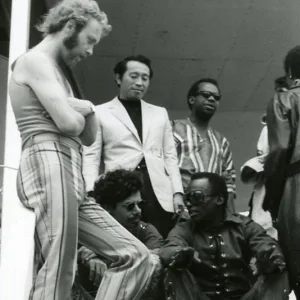 It’s on the release “Nine to the Universe”. It was released in 1980 and the producer was Alan Douglas.
It’s on the release “Nine to the Universe”. It was released in 1980 and the producer was Alan Douglas.
Alan Douglas wasn’t there but he was involved with Jimi’s recording projects.
The credits say Larry Young on organ.
Maybe I’m wrong.
No, no. After Jimi’s death, they put out releases, so maybe they didn’t have all the information.
Yeah, well, I don’t know. Sorry.
You come from a different background than Jimi Hendrix. How challenging was it for you to be on the same page musically with him during your jams?
I think he had played with Muddy Waters and of course The Jimi Hendrix Experience trio was an extraordinary band and I used to listen to that band before I even had the chance to play with him. My background was rock ‘n’ rock when I started when I was 13 and I was listening to all the pop music, including rhythm & blues like Chuck Berry, Little Richard and Bo Diddley. So, I came through a period of time when that music was around and that was what we were playing on gigs. I was doing dances, playing at dance halls and clubs and so on and it was really when I was 17 I switched to acoustic bass and made that my main instrument. Of course, I started listening to jazz when I was 14 or 15 and I quickly fell in love with that music. I don’t know about background; you bring to the table what you have to offer and I had these experiences and I guess I tapped into those and it seemed to work out ok.
Miles jammed with Jimi at Miles’ house. Had you ever jammed with Miles and Jimi at the same time?
No.
Is there right or wrong in jazz?
What do you mean?
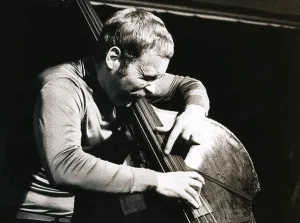 Can you play anything and then audience decides if it likes it or not or are there rules that you must follow?
Can you play anything and then audience decides if it likes it or not or are there rules that you must follow?
It’s a complicated question. Let’s say you are playing a song that has a form, if you lose the form, then that’s no good. So, let’s say there is a composition that has 24 bars and certain things happen in those 24 bars and when you improvise you are shuttling around these 24 bars. Now, if you don’t keep that form then everybody doesn’t know what it’s going on. That’s a big thing. Now, when you are playing that song, let’s say there is a harmony, you can play any note on any harmony, it’s a matter of how you play it. There are no wrong notes as long as you create a context for them to be right.
Thanks. How important is improvisation to you?
Well, it’s the essence of the music.
Is playing with different people a kind of evolution too?
I can’t speak generally to what it’s better for other people, but for me, I like to expand my understanding of the music. Sometimes, I get an opportunity to play things which are different to what I would normally do in my own group and these things help feed my creative ideas. So, I had a wonderful experience of playing with some flamenco musicians in the last few years. Pepe Habichuela, who is a great flamenco guitarist and that was a fantastic experience. I’ve also played with Arabic and Indian musicians and these have all been very stimulating experiences for me and they ‘ve made me think in new ways about music, which is what I like to happen because it keeps me open to new ideas and expands the language of the music for me.
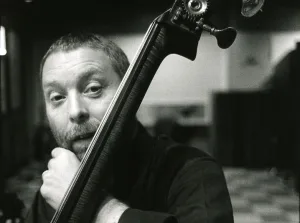 Was it playing at a Greek restaurant in London a stepping stone to your future successful career as a musician?
Was it playing at a Greek restaurant in London a stepping stone to your future successful career as a musician?
Absolutely, yeah, of course. Every step is. It’s how I got to London. I was on tour with a big band and the tenor (ed: saxophone) player in that band was a Greek man and during the tour he asked me if I would like to move to London, because I lived in the Midlands area, near Birmingham and I wanted to go to London. When he asked me if I would go I said: “Absolutely, I would love to go!” so I moved to London in August or September of 1963, and I spent a year there at a Greek restaurant. He played accordion and bouzouki and I learned the bouzouki as well because I played a little guitar and we used to do duets. It was a piano trio plus he played accordion, tenor saxophone, bouzouki and sang. While I was doing that gig for a year, I started studying with a very fine classical bass teacher in London and following that I got admission to the Guildhall School of Music in 1964 and I began a 3-year programme there. So, it was a very important opportunity I had and it was the first time also that I ever played songs that were in time signatures of 7 and 9 (ed: 7/8 and 9/8) because before that I only played in 4/4 and 3/4. I still remember the rhythms.
Miroslav Vitous (Weather Report -bass) told me that jazz is dead, jazz is finished because there aren’t great musical personalities like Wayne Shorter and Herbie Hancock anymore. Do you agree with this?
No, I don’t agree with that.
Could you please tell us a few words about Wayne Shorter who passed away last year (2023) ?
He was a unique genius, a master improviser, 100% original composer but an original that had come through the most incredible tradition of the music and kept moving forward, just as Miles Davis did. He was never satisfied to just keep doing the same thing and the same thing… He wanted his music to continue to expand and that’s what he did.
Could you describe to us the chemistry you had with Jack DeJohnette (drums) as a rhythm section?
Jack and I met in 1967 in London, he was on tour with Charles Lloyd (tenor saxophone, flute) and we met at a jam session that he came to late at night. From the very first time we played, from the very first beat, it just felt perfect, it just felt like we knew how to play with each other and that’s the way to be ever since. He is a dear friend, incredible drummer, we share so many wonderful experiences, both personal ones and musical ones.
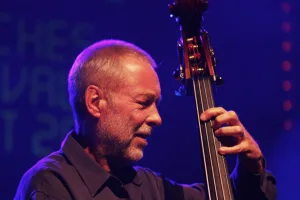 Do you remember the concert you played with Prism in Athens in 2015?
Do you remember the concert you played with Prism in Athens in 2015?
I certainly do. I remember being at a very nice theatre we played in (ed: Onassis Stegi), a great audience, I remember it being a very joyful concert. Coming to Athens, in some way, is a personal experience for me too, because I have family on my late wife’s side, she was British, but her sister married into a Greek family, so I have a niece and a nephew who are Greek. Of course, I will always look forward to being in Athens, I see some parts of the family sometimes when I ‘m there. My late wife’s mother and father retired in Greece also, they lived on the island of Evia, so I spent time with them there, as well. I will be in Athens on 25th April. Kevin Eubanks will not be on the tour, because he was advertised as being on my tour in April, which is in Europe. I’m in Europe for the whole of April. Jaleel Shaw is playing saxophone. I would like to mention why Kevin cannot tour and that Jaleel will be taking his place.
Tony Williams came from Boston and joined Miles Davis when he was 17 years old. Are there those kinds of opportunities nowadays?
Yes.
Ron Carter (Miles Davis Quintet) told me: “The first take in the studio is always the best, because the first time you play the music, the second time you play yourself”. Do you agree with this?
I am not gonna disagree with Ron Carter. You know, sometimes the first take is the best, I can say that, but I’m not disagreeing with Ron. I respect his opinion.
Do you have any musical ambitions left?
Right now to keep playing (laughs), yes, as long as I can feel that it’s meaningful. That’s my ambition, that’s what first comes to mind, anyway. My immediate musical ambition is to develop the quartet that I just started last year with Kris Davis on piano, Jaleel Shaw on saxophone and Nasheet Waits on drums. We made a tour last summer and we ‘ve been working this year on gigs as well. So, that’s my immediate wish to develop that group.
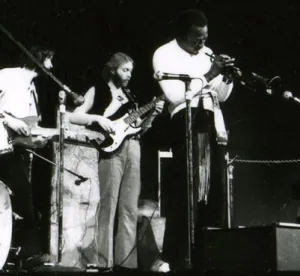 Will you release an album soon?
Will you release an album soon?
This group is gonna record in the fall, after the summer. My next album is coming out as a duo with Lionel Loueke (guitar).
Do you think because of the streaming services listening to an album from start to finish is now becoming a kind of lost art?
Some people prefer to just listening to tracks and there are other people that still look at the album as a collection of events and I know when I am putting an album together, I think a lot about this: What journey the sequence of songs takes you on, I think this is very important and to experience at least my vision of recording, it’s nice if people can still have a chance to sometimes listen to the whole album as a complete set of events. But I ‘m just happy that people listen to the music at all and if they only want to hear some tracks, I have no problem with that, no.
A huge “THANK YOU” to Mr. Dave Holland for his time.
Official Dave Holland website: https://daveholland.com/
Official Dave Holland Facebook page: https://www.facebook.com/davehollandjazz


